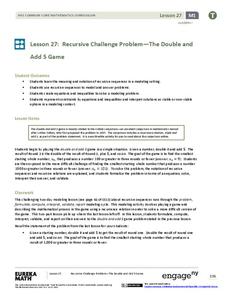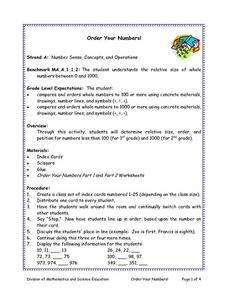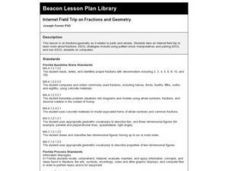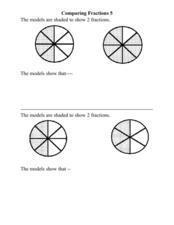Curated OER
I'll Halve S'More, Please!
An episode of Cyberkids is shown, and learners interact with web based activities to discover how fractions are parts of a whole. They study the names of fraction parts, add and subtract fractions, and recognize equivalent fractions.
EngageNY
Recursive Challenge Problem—The Double and Add 5 Game
As a continuation of a previous activity, this activity builds on the concept of calculating the terms of a sequence. Pupils are challenged to determine the smallest starting term to reach a set number by a set number of rounds. Notation...
Illustrative Mathematics
Finding Areas of Polygons, Variation 1
An exercise in finding the area of polygons by decomposing into triangles and composing into rectangles is the focus of this resource. Make several copies of the worksheet for each participant. Ask learners to use colored pencils to...
Curated OER
Find 1
Extend your class's ability to represent unit fractions on a number line with this challenging worksheet. Given two number lines, one labeled with zero and 1/4, the other with zero and 5/3, learners must accurately locate the number one...
Illustrative Mathematics
Banana Bread
Show your future bakers how to choose the right baking pan by calculating the volume of a pan. The resource compares two pans, one with decimal edge lengths and is too small for the recipe and one that may work. Your number crunchers are...
Bowland
Fashionista
So trendy! Show your class how to identify trends in sales patterns using mathematics. Scholars use a software simulation to collect data on age groups, price, and sales at a fashion store. This data allows individuals to determine the...
Rational Number Project
Initial Fraction Ideas Lesson 18: Overview
Develop young mathematicians' ability to compare fractions with investigation into the number 1/2. After brainstorming a list of fractions equivalent to 1/2, children identify a pattern in the numerators and...
Curated OER
Percent Box
Students examine the procedures to determine a number when the percentage of the whole is known or to find the whole number when the part or percentage is known.
Curated OER
Technology Lesson Activity: Fractions
Fifth graders practice using the English measuring system by creating fractions. In this parts of a whole lesson, 5th graders combine math key bars to simulate small parts of a bigger item. Students combine the pieces to...
Curated OER
Order Your Numbers
Students examine the order of whole numbers that range from 0 to 1,000. They compare and contrast the quantities of different numbers using the number line, objects, and symbols of comparison. Students also work as a class with cards to...
Curated OER
Internet Field Trip on Fractions and Geometry
Students take an Internet field trip to research fractions. ESOL strategies include using pattern block manipulatives and pairing ESOL and non-ESOL students on computers.
Curated OER
Divide and Conquer
Seventh graders analyze responses to different types of problems. Using pictures and diagrams, they explore and model the division of fractions. Students examine situations that call for division whether with the whole numbers or with...
Curated OER
Number and Number Relations: Lesson 2
Fourth graders participate in using the terminology of more, less, between, compare, and order. They compare whole numbers and use the symbols for <, >, =. They order whole numbers and practice with problems where they use this...
Curated OER
Number and Number Relations: Lesson 3
Eighth graders compare whole numbers and decimals. They use symbols for <, >, =, and order whole numbers and decimals. They practice the meaning of positive and nugative integers by using them to describe real-world situations.
Curated OER
Little Mouse, the Red Ripe Strawberry and Big Hungry Bear Lesson Plan
Students create a fruit salad using pieces of fruit cut in halves. In this early childhood lesson plan, students discover the concept of half and whole. Students experience this concept in a hands-on activity in which they cut fruit...
Curated OER
What Makes Ten
Students investigate the concept of ten and how it is part of the real number system. They find the quantity of ten using as many combinations as possible. They can count using manipulatives, write on paper, or by doing mental math.
Curated OER
Fractions
Students observe and demonstrate a variety of activities to identify the fraction parts and the symbols they represent. As a class they explore different fractions using unifix cubes, then use the cubes to build and discuss the...
Curated OER
Stirring up Fractions
Second graders practice unit fractions to identify parts of the whole and parts of a set. They utilize a variety of manipulative's including recipe boxes to get them started stirring up fractions. A multitude of books on fractions are...
Curated OER
Length Lotto-Teacher's Notes
Students convert metric units of length, specifically meters, centimeters, and millimeters. In this lesson of converting measurements, students participate in various games which require them to put the measurements in order or convert...
Curated OER
Let's Share Equal Parts
Students practice creating parts of a whole by using educational software to illustrate their learning.
Curated OER
Mystery Stars: Estimating Whole Numbers Using Fractions Shown on Sectors of a Circle
In this set of fraction worksheets, students cut out 6 pages of circles that show fractions with stars covering different sections of circles. They show one section of the circle in order to estimate the whole number of stars by looking...
Curated OER
Comparing Fractions 4
In this elementary math worksheet, students examine the shaded fraction models and compare them to the value given. Then they answer the 3 questions in the multiple choice format.
Curated OER
Comparing Fractions 5
In this elementary math worksheet, 4th graders compare the circle graphs expressed as fraction models in order to determine the fraction values for the four graphs.
Curated OER
Comparing Fractions 6
In this math worksheet, young scholars compare circle graphs that are used as fractional models. They determine the fraction value for each while writing each ratio for the four questions.

